Description
CHAPTER ONE
INTRODUCTION
- Background to the Study
This project is on effective teaching and learning of biology in secondary schools. Education is a preparation for life. This is related to the acquisition of skills to earn a living. Today as always, the definition of education is the ever change and increasing in scope. Our schools are confronted with new pressures arising from changing needs with students; societal expectation, economic changes and technological advancement are to look into (Federal Ministry of Education, 2008).
Ali (2002) believes that the word science stands for a variety of information, abilities and operations about the natural environment. He believes that science is more concerned with various investigative processes and activities with regards to developing, acquiring, and controlling knowledge, skills, attitudes and capabilities about the natural factors of the environment. According to Aniodoh (2009), science is a body of knowledge arrived at through systematic and procedural processes based on tentative observation and experiment.
Biology as one of the science subject is defined as the study of life and structure of living things and concerns itself with the study of structure, behavior, distribution, the origin of plants and animals and their relationship with the environment. Abugu (2007) stated that biology is a natural science in which the study living organisms-plants and animals. Biology has been identified as the bedrock of understanding life, treating ailment and maintenance of ecosystem. However, it has been discovered that secondary school students have misplaced biology in their choice of subject on the basis that biology is too wide for them to cope with teacher have always been blamed for students poor performance in biology but should not be allowed to bear the whole blame alone, rather it should be looked at as a problem that has many contributory factors among which are teaching aids, students and government factors.
The West African Examination Council (WEAC) and National Examination Council (NECO) among others syllabus on biology is structured using the conceptual apparatus. It is expected that with adequate exposure to the syllabus, the students will not only acquire scientific skill and attitudes, but will also demonstrate a thorough understanding of scientific concepts and then in providing practical solutions to real life problem (Bandele, 2003). Achievement test results over the years have shown an ever decreasing gap between the performances of Biology at senior secondary school level in Makurdi Local government Area of Benue State (Onekutu and Onekutu, 2002). Available statistics from West Africa Examination Council, WAEC Chief Examiners’ report that WAEC May/June 2016, a total of eight hundred and seventy eight thousand and forty (878,040) candidates, representing 52.97%, obtained credits in five (5) subjects and above, including English Language and Mathematics.
There are varieties of materials which the Biology teachers use. These resources are models, charts, preserved specimens of plants and animals, culturing equipment and microscope (Olagunju, 2000). The resources should be provided in quality and quantity in classroom for effective teaching-learning process (Umeoduagu, 2000). Josiah and Ali (2013) in an empirical study, revealed that essential facilities such as equipment like radio, television, computers, chemicals, specimens, videos tape, stave, Bunsen burners, models and charts are not available in schools. This inadequacy of teaching materials, laboratory, space, has been of serious concern to educators.
According to Ajewole and Okebukola (2000), a number of factors are said to have contributed to the students’ poor academic achievement in school, some of these factors include: poor study habits and lack of available resource materials, teachers’ ineffectiveness, the teaching method and the type of learning environment available for both the students and the teachers. From the authors view, the poor performance of students in Biology may be a reflection of the type of learning environment. The authors stress that a host of these factors may surround students’ poor achievement in school which may include: poor study habits and lack of available resource materials, poor school climate, indiscipline, inadequate facilities, teachers’ ineffectiveness, the teaching method and the type of learning environment available for both the students and the teachers. From the authors view, the poor performance of students in primary school may be a reflection of the type of learning environment. Obaka (2005) observed that school environment may have negative influence on students’ academic achievement especially if such environment lacks good school climate, instructional materials, discipline, physical facilities, has poor teacher quality, type of location of school is questionable.
The decline in performance in science Technology and Mathematics (STM) may be unconnected with poor learning environment created by this state of infrastructural facilities Akinsola (2000). Mapaderun (2002) also emphasized that the availability and adequacy of these facilities promote effects teaching and learning activities in schools while there in adequacy affects the academic have performance negatively. Several efforts have been extended by science Teachers Association of Nigeria (STAN) to train secondary school teachers on improvisation techniques in various on science subject including Biology; hence there is need to valuable how far teachers have been able to improvise instructional material for effective teaching.
Despite the expected benefits of utilizing material resources in the teaching/learning process, there has been consistent failure in students’ performance in biology of the West African Senior School Certificate Examination in biology in Nigeria (Umeh, 2006). The failure has been attributed to under-utilization of some material resources in teacher training institutions. Umeh (2006) is of the view that audio visual aids such as television, computers and projectors are not utilized in schools due to lack of knowledge on the proper use of such resources for teaching. Jatua and Jatau (2008) expressed the view that material resources utilized by teachers in teaching science (biology) were textbooks, chemicals, charts, microscopes, chalkboards and flasks which are cheap and have wider applicability in the teaching and learning of biology in schools. Onyeji (2003) had earlier reported that none of these new media is available, accessible or used in communicating Science, Technology and Mathematics (STM) in secondary schools. From the research findings, biology teachers agree that lack of skills/competencies required for resources use, insufficient period for practical work, inadequate laboratory and instructional materials, heavy teaching loads and large class size are the biggest factors hindering the use of resources in teaching biology. Imogie (2010) attributed the problem to increase in students’ enrolment into science subjects (especially biology) which makes the available resources to be grossly insufficient for any meaningful activity-based learning.
With respect to learning facilities, it is an open secret that vast majority of our secondary school lack the equipment and materials for meaningful teaching and learning of biology (Oludipe and Lasisi, 2006).
1.2 Statement of the Problem
The relevance of education in any society cannot be understated. It is regarded as the single potent factor that leads to the improvement of the individual as well as society (Imogie, 2010). The need to provide basic formal education to all schools whether public or private sector in Makurdi Local Government Area of Benue State is therefore a paramount social responsibility (Ada, 2005). The question of how credible the students, teachers education programmed is in terms of assessment of the resources available for the effective teaching and learning of biology in secondary schools has remained a major issue of interest to many people in Makurdi Local Government Area of Benue State and environs (Adzemba, 2006).
The quality of instruction, teachers, and equipment in Biology are usually considered sub-standard, in adequate equipment and lack of teachers contribute to the poor teaching of Biology education, Shortage of qualified science teachers and lack of equipment amongst others have been identified as constraints against the advancement of science education in Nigeria (Akoja, 2006). For Nigeria to meet up with the challenges of human capacity development for sustainable development there must be both material and human resources. Many schools do not have Biology laboratory and teachers are often unqualified (Anyamebo, 2005). Research has shown that poor perception over the production of instruction materials in schools, low level of utilization of these materials, Non challant attitude of teachers towards improvisation of materials, poor funding, lack of equipment, laboratories are major causes of poor educational materials (resources) in the impermanent of Biology education programmed (Aliade, 2008). For learning to be meaningful and permanent, it is necessary that instructional resources be used.
It is on this premise that the researcher is motivated to assess the available resources for the effective teaching and learning of biology in secondary schools in Makurdi Local Government Area of Benue State.
1.3 Purpose of the Study
The general purpose of the study is to assess the resources available for the effective teaching and learning of biology in secondary schools. Specifically the study is to:
- Determine the Qualification of biology teachers in Secondary Schools in Makurdi Local Government Area of Benue State.
- Find out the Method of instruction used by the biology teachers in Secondary Schools in Makurdi Local Government Area of Benue State.
- Ascertain the Resources available for the effective teaching and learning of biology in Secondary Schools in Makurdi Local Government Area of Benue State.
- Determine how often the available resources are used by Secondary Schools in Makurdi Local Government Area of Benue State.
- Identify the problems teachers encounter in teaching and learning of biology in Secondary Schools in Makurdi Local Government Area of Benue State.
1.4 Research Questions
- What are the Qualifications of biology teachers in Secondary Schools in Makurdi Local Government Area of Benue State?
- What are the methods of instruction used by the biology teachers in Secondary Schools in Makurdi Local Government Area of Benue State?
- What are the resources available for the teaching of biology in Secondary Schools in Makurdi Local Government Area of Benue State?
- How often are the available resources used by Secondary Schools biology teachers and students in Makurdi Local Government Area of Benue State?
- What are the problems teachers encounter in teaching and learning of biology in Secondary Schools in Makurdi Local Government Area of Benue State?
1.5 Significance of the Study.
The usefulness of this research work in education cannot be overemphasized of the result of the study if properly utilized; it is going to be beneficial to the students and teachers.
- To students, it will enable them to know their performance in biology examinations as well as provide a room for improvement. By the use of the available resources, it helps biology students to develop positive attitudes and interest in the subject by full participation in the teaching- learning process.
- To the teachers, the result of the study will make meaningful recommendations regarding resources available for the effective teaching and learning of biology in secondary schools in Makurdi Local Government Area of Benue State. By the use of the available resources, it helps biology teachers to be conversant with the different methods of instruction to use when teaching and also helps to improve their knowledge on the use of the available resources.
1.6 Scope of the study
The study was based on the assessment of the resources available for the effective teaching and learning of biology and restricted to Makurdi Local Government Area of Benue State.
1.7 Definitions of terms
Certain terminologies are defined strictly on the context of this study as follows:
Assessment: An opinion or a judgment about somebody or something that has been though about very carefully.
Resources: This is something that can be used to help achieve an aim or objectives especially a book, equipment etc, that provides information for the teachers and students in order to increase the worth of education.
Available: The present of resources for the accomplishment of a purpose.
Effective: Process of producing the result that is wanted or intended.
Teaching: The act of transmitting knowledge, attitudes, skills from a knowledgeable and skills person to other people.
Learning: The activity or process of gaining knowledge or skills by studying, practicing, being thought, or experiencing something.

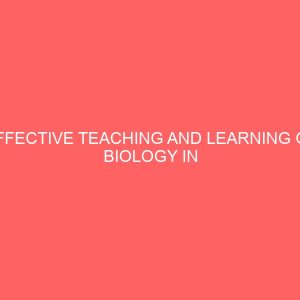
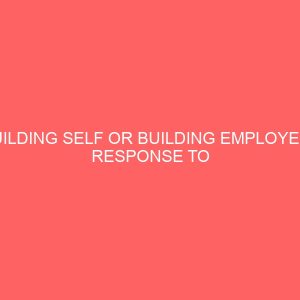
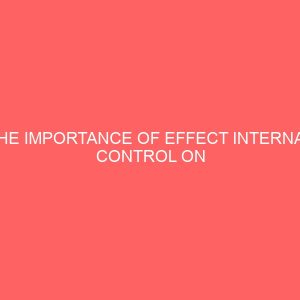
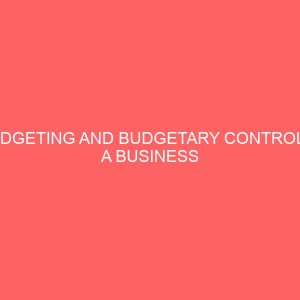
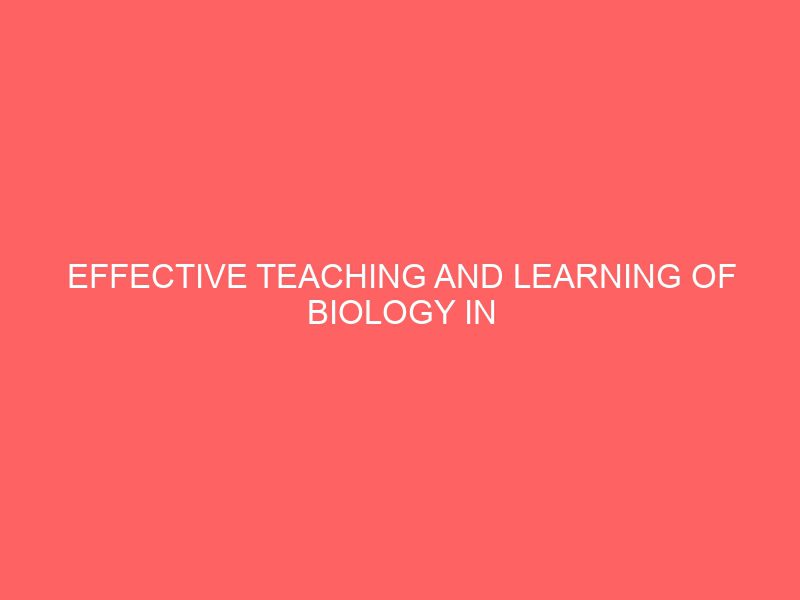


Reviews
There are no reviews yet.